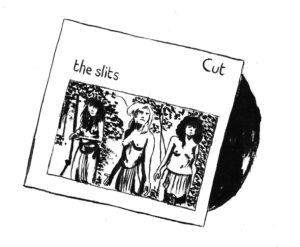Legendary music journalist Everett True is the man who infamously introduced Kurt Cobain to Courtney Love, championed the Riott Grrrl movement and whose brilliantly brutal writing with the likes of Melody Maker, Plan B and more recently on his own Collapse Board site, has provoked and entertained for decades. True is now raising money to publish his biography ‘The Electrical Storm’ otherwise known as “Tall Tales & True” or “Grunge: My Part in its Downfall”. Its billed as a ‘collection of short stories in the style of William Saroyan attempting to recollect a life probably best forgotten, the life of music critic Everett True. Sad racy stories. Downbeat enthusiasm. Funny, cruel, clever, brutally honest.
Featuring a cast of dozens – Shop Assistants, Membranes, Huggy Bear, Nirvana, Yeah Yeah Yeahs, Hole, The Jesus Lizard, Alan McGee, David Bowie, The Rolling Stones, Yoko Ono, Ramones, Dexys Midnight Runners, Talulah Gosh, Melody Maker, NME, and so forth. Flights of fanciful imagination, half-remembered bar stories or a gritty deconstruction of the life of a faded music critic? Who can say. Comes replete with 83 drawings from the pen of French illustrative genius Vincent Vanoli – and featuring several guest writers from various cult bands.”
So he’s looking for your backing to help fund its release,, he needs around £5000 to be precise, so dig deep and go here to back him. Here’s what they say “We’ll need to cover all the financial aspects that go into publishing a book, as well as paying our lovely contributors (Everett and Vincent) for their hard work. What we hope to achieve is something so attractive you’ll want to have it on your coffee table and so funny you’ll read it time and time again.”
To celebrate he’s given us two free stories from his potential book for your reading pleasure. Here is the first “Ari” by Everett True:
Ari
I moved to London because of The Slits.
More specifically, I moved to London because of a song on The Slits’ debut album Cut called ‘Shoplifting’. It sounded as though the four girl musicians were having such a great, great time – all the squeals and giggles of glee as they ran shrieking away from the besieged store. The bass looped, pounded, and panted in sympathy behind them, the guitar played all shrill discord and exclamation marks. The vocals were…dirty. “Ten quid for the lot/We paid FUCK-ALL,” they boasted, out of breath. Never had I heard girls sound so natural and unafraid and mischievous, so comfortable with their own naughtiness. (Years later, the same qualities attracted me to Olympia’s righteous, contradictory Bikini Kill and London’s turbulent Huggy Bear.) Never had I heard anyone – male or female – sound so free, so in love with the limitless possibilities of life.
Sure, I used to steal from shops – but to me, it was more of a necessity. I could never afford the vinyl I craved. The risk usually outweighed the adrenaline rush. I was – to put it frankly – a wuss. The Slits sounded like anything but, as they moved unchecked through their West London streets. “Is this what the big city is like?” I wondered. “A place where girls like The Slits run rampant on the underground and down dark alleyways, a place where punk gigs happen in dark, dub-heavy Ladbroke Grove clubs – playing music like that created by Cut producer Dennis Bovell – not in a fucking Chelmsford community centre?” Listening to ‘Shoplifting’ made me want in, so bad.
I knew little of The Slits beyond that album. I mostly preferred The Raincoats – their scratchy, wired music was tempered with what sounded suspiciously like comforting upper-middle class accents; their music was more insular, more frightened and fettered than that of their female brethren. I could relate to it more – I could imagine holding conversations with The Raincoats where we drank tea and chatted about Women’s Problems. I preferred their version of ‘Adventures Close To Home’, the song they shared with The Slits (they also shared a drummer, Palmolive), because…well, because it wasn’t so reggae. It took me a while to grow accustomed to such an alien culture.
The Slits scared me, frankly. They were only about 16, for Chrissake! Even younger than me. Their singer, Ari Up, wore her underwear un-erotically, yet very disturbingly, on the outside of her clothes. They couldn’t give a fuck about other people’s opinions. On the cover of their debut album, they covered themselves in mud, naked – London nature girls having a riot. That much was clear even to a politically corrected boy such as myself. Did the cover influence my decision to buy the record? No way. The cover of Cut may have been many things – provocative and smart not the least among them – but it certainly wasn’t sexy. Again, the girls had managed to subvert conventional sexual imagery through sheer cheek.
On the down side, The Slits had supported The Clash (boo! hiss!) on their 1976 White Riot tour – alright, a good year before my Year Zero when I discovered pop music, and thus ancient history, but still a big minus. We hated The Clash with their combat gear and posing with machine guns in Ireland, and that macho crap about “white riots”. It wasn’t until years later that I discovered – through a fax from Joe Strummer, who had been stung into replying to one of my Melody Maker taunts about how “punk rock died the day [he] strapped on a guitar” – that much of The Slits’ formative attitude, and indeed profile, was due to their status as Clash girlfriends.
My illusions were shattered…until I realised that (i) yes, they were allowed to have sex, and (ii) it didn’t change the unalterable fact that The Slits were 10,000 times better and more important – in terms of influence on later generations of musicians – than any sad bunch of Rolling Stones wannabes could ever be. I’ll give Joe kudos for being a decent bloke, and for introducing Ari, Viv Albertine, Tessa Pollitt, and Palmolive to the sweet sound of reggae and dub, but that’s it.
Anyway. I digress.
So yeah, I was intimidated – a feeling which only intensified when I moved to London and started attending Slits concerts, only to witness two stabbings, one of a kid standing next to me. The latter happened because the two of us had been arguing with some skinheads (omnipresent in late 1970s London) who’d been heckling The Slits’ support band, the proto-electronica Deptford band This Heat. “What d’ya do that for?” I asked bravely, if a trifle foolishly. “Because I felt like it. D’ya want some?” came the reply, followed menacingly by another question: “Are you a Jew?”
Fuck punk concerts and their bonehead fans. I knew The Slits had nothing to do with their audience – and indeed, you’d think that the mere fact they were women in a fiercely patriarchal world playing heavily dub-influenced punk rock would have been enough to dissuade even the most bone-headed of thugs from attending their shows, but no. Media image is sometimes all. And boy, were there some distorted images flying around back then.
So I went back to listening to Cut in my south-east London bedsit, and buying all The Slits bootlegs and records I could get my hands on – also The Raincoats and The Au Pairs and The Poison Girls and Delta 5 and The Leopards and (the sadly defunct) X-Ray Spex and Penetration and Yoko Ono and all the great slew of women-only bands and women-fronted bands that had sprung up in the immediate aftermath of punk in the UK. Because it was from these bands, and these bands alone, that I got a sense of the world outside of my stunted English Public School upbringing…I already knew what men were like, what bullies they were, and how tedious the weight of patriarchal history was. I knew all that. I was ready to have some fun.
Cut yielded one astonishing single, ‘Typical Girls’. Its subject matter was, of course, about anything but. Typical girls wore white stilettos and short skirts with no stockings in the height of winter, and drank Babycham in cheesy disco clubs in Romford called the Pink Flamingo, hanging on the arms of only the most obnoxious brutes. Typical girls populated Sham 69 songs, or played the part of the brassy, bossy blonde in 1970s English sitcoms – they weren’t sassy and fun and boasting about leaving “smells” the way The Slits wanted – but perhaps they were. I had no way of judging. And I loved The Slits for making me realise that there was more to girls than the patronising English Public School archetype.
The Slits introduced me to the “female gang”, a concept hitherto confined to Russ Meyer tittie-fests and cheap 1950s sexploitation flicks. The Slits introduced me to the concept of “sex” with all its attendant glorious smells and tumbles and squeals of jealousy and open-air liaisons. The Slits taught me the concept of freedom, showed me that life didn’t begin and end with the cradle-to-grave route of school-university-office-job-marriage-retirement, that there were illicit pleasures to be gained and wrongful pacts to be made, that life wasn’t as serious as I had imagined.
I never shoplifted when I moved up to London, though. I was too scared.
More information
https://www.indiegogo.com/projects/the-electrical-storm#/





